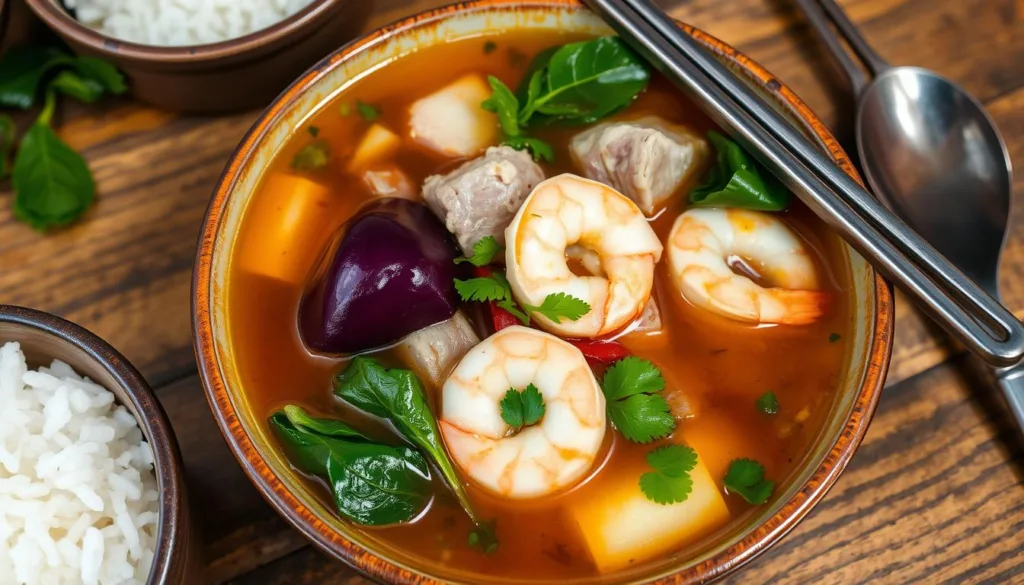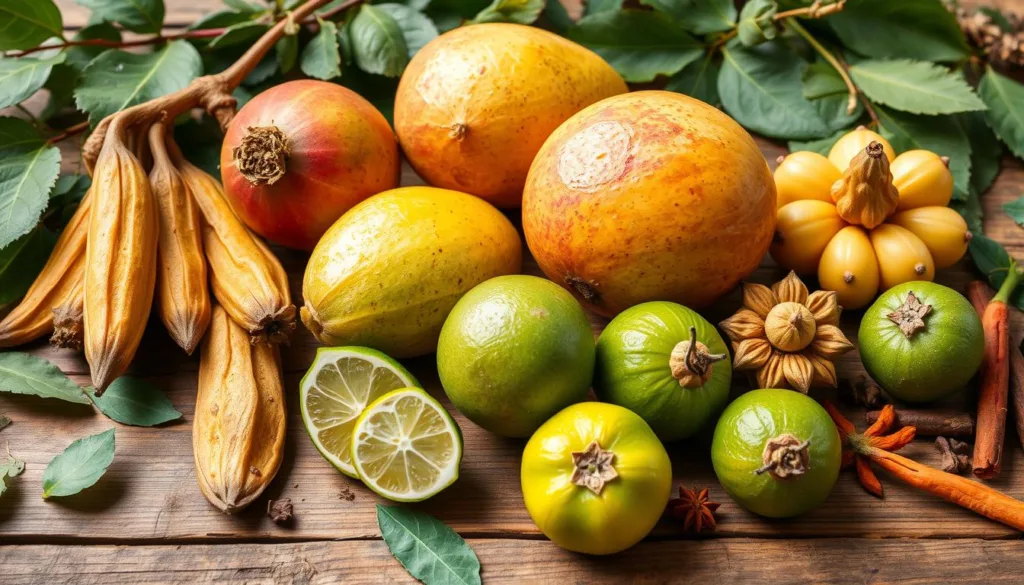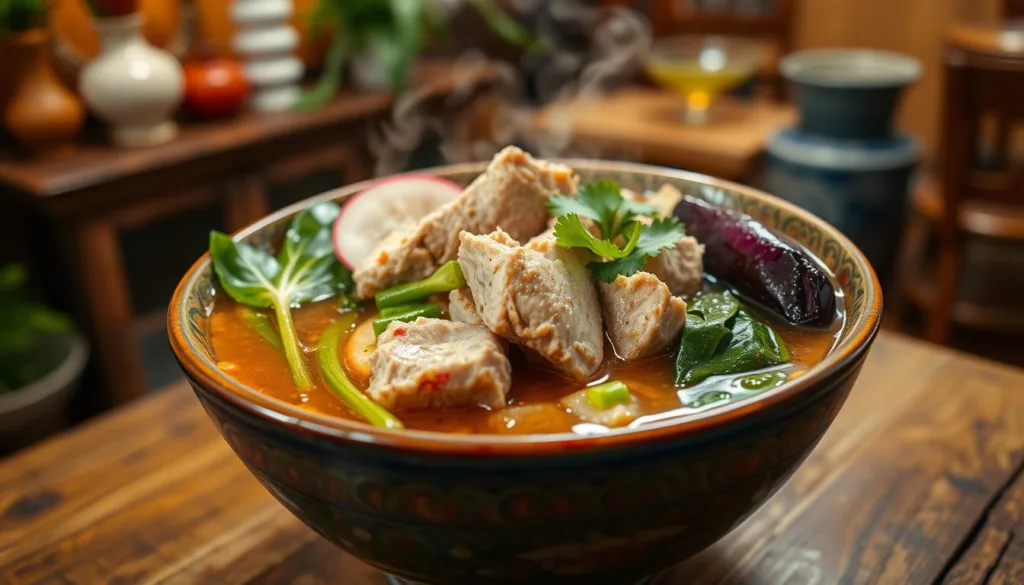Sinigang Recipe :
Sinigang is a beloved dish in Filipino cuisine, passed down through generations. It’s known for its sour and savory flavor. This makes it a must-try for anyone wanting to taste the Philippines.
Its rich history and cultural significance make sinigang a staple in Filipino homes. It has even gained popularity worldwide, with TasteAtlas naming it the best vegetable soup in 2021.
The dish’s sour broth is made with tamarind or other souring agents. It’s mixed with various vegetables and proteins like pork or shrimp. Sinigang reflects the country’s culinary heritage and has many variants, such as sinigang na hipon and sinigang mix inasal na manok.
Whether you’re a food enthusiast or just looking to try something new, this sinigang recipe will delight you. It will leave you wanting more of this delicious Filipino dish.

Embarking on this culinary journey, you’ll learn the importance of fresh ingredients and traditional cooking methods. With this ultimate sinigang recipe , you can create an authentic Filipino dish. It will transport your taste buds to the Philippines and show you the warm hospitality of the Filipino people through sinigang.
Understanding Sinigang: The Heart of Filipino Cuisine
Exploring Filipino cuisine, you’ll find sinigang is more than a dish. It shows the country’s rich history and culture. It started long ago, using souring agents like tamarind and guava. These were common in the area.
Sinigang is a traditional recipe passed down through generations. It has a sour broth made with tamarind or other souring agents. The sourness is balanced by the richness of proteins and vegetables, making a unique flavor.
What makes sinigang special is its use of souring agents. Tamarind is a favorite, adding a unique flavor and aroma. Guava and calamansi juice are also used, each adding its own twist to the dish.

| Ingredient | Description |
|---|---|
| Pork, seafood, beef, and plant-based proteins | Commonly used proteins in sinigang recipe |
| Tamarind, kamias, calamansi juice, and green mangoes | Popular souring agents used in sinigang |
| Kangkong, radish, tomatoes, okra, and eggplant | Vegetables commonly included in sinigang |
Sinigang is deeply rooted in Filipino cuisine and culture. It has a rich history, unique flavors, and many ingredients. Whether you love food or want to try something new, sinigang is worth exploring.
Essential Ingredients for Your sinigang recipe
To make a real sinigang dish, pick the right souring agents and proteins. Tamarind, guava, or bilimbi are top choices for souring. Proteins like pork, shrimp, or chicken are also favorites.
Pork is the go-to protein, but you can try salmon or chicken too. For vegans, skip animal products and use vegan fish sauce or soy sauce. The goal is to mix flavors and textures for a tasty sinigang.

Vegetables like okra, daikon, tomatoes, and leafy greens are key in sinigang. They add flavor, texture, and nutrients. Mixing these ingredients will help you make a sinigang that’s both tasty and true to its roots.
Remember, the quality of your ingredients can make or break the flavor and texture of your sinigang. Choose fresh and high-quality Filipino ingredients to ensure the best results.
| Ingredient | Quantity |
|---|---|
| Pork spare ribs | 1 ½ lb |
| Seedless tamarind pulp or tamarind paste | 45g or 4-5 tablespoons |
| Fish sauce | 2 tablespoons |
| Baby bok choy or other greens | 3 heads |
By using the right souring agents, proteins, and Filipino ingredients, you’ll make a sinigang that will wow everyone. It’s a dish that’s sure to delight your family and friends.
Step-by-Step sinigang recipe for Perfect Results
To make a tasty sinigang, start by cooking onions and tomatoes. Then, add proteins and souring agents. Let it boil, then simmer until the flavors mix well. This sinigang recipe needs patience and focus on flavor balance.
Remember, Filipino cooking is about finding harmony. The sinigang recipe uses many ingredients like pork, tamarind, and veggies. These all blend to make a unique taste. Follow these cooking tips to make a sinigang that’s both true to its roots and delicious.

In Filipino cooking, using fresh ingredients is key. Tomatoes and onions add flavor, while pork brings richness. With the right ingredients and cooking tips, your sinigang will be unforgettable.
As a popular Filipino dish, sinigang has gained recognition worldwide for its unique flavor and versatility. With its rich history and cultural significance, sinigang has become a staple of Filipino cuisine, and its popularity continues to grow.
By following this sinigang recipe and using these cooking tips, you can make a delicious sinigang. It’s sure to impress your loved ones. So, why not try it and enjoy the rich flavors and traditions of Filipino cuisine?
Customizing Your Sinigang
Exploring sinigang shows how important customization is. You can choose from different proteins like pork, shrimp, or chicken. Add various vegetables like eggplant, okra, or bok choy. This makes Filipino cuisine special, letting you make the soup your own.
Customizing sinigang also means playing with flavors. You can adjust the sourness by changing the tamarind amount. This lets you make the soup taste just right for you. Whether you like it mild or bold, you can make it your way.
Try adding seafood like shrimp or mussels, or use different meats like pork ribs or chicken. Experiment with veggies like snake beans or taro root. This way, you can make a sinigang that shows off your favorite tastes.

Customizing sinigang lets you fully enjoy Filipino cuisine. So, don’t be shy to try new things. With sinigang, you can make a meal that’s both delicious and unique.
| Customization Ideas | Ingredients | Flavor Profile |
|---|---|---|
| Seafood Sinigang | Shrimp, mussels, fish | Sour, savory, umami |
| Pork Rib Sinigang | Pork ribs, tamarind, vegetables | Rich, tangy, slightly sweet |
| Vegetarian Sinigang | Various vegetables, tamarind, tofu | Light, refreshing, slightly sour |
Serving Your Homemade Sinigang with Traditional Filipino Side Dishes
When you serve your homemade Sinigang na Baboy, pair it with classic Filipino side dishes. A bowl of steamed rice is perfect for soaking up the tangy broth. Fried tuyo, or dried salted fish, adds a nice crunch and flavor contrast.
These traditional sides make your meal even better. They let you enjoy the true taste of Filipino cuisine.
How you present your dish matters. Arrange the pork, veggies, and broth nicely. Add fresh herbs or toasted garlic for extra flavor and look.
This makes your meal even more exciting. Whether it’s for family or guests, Sinigang na Baboy with Filipino sides is a treat. It will make you want to have more.


